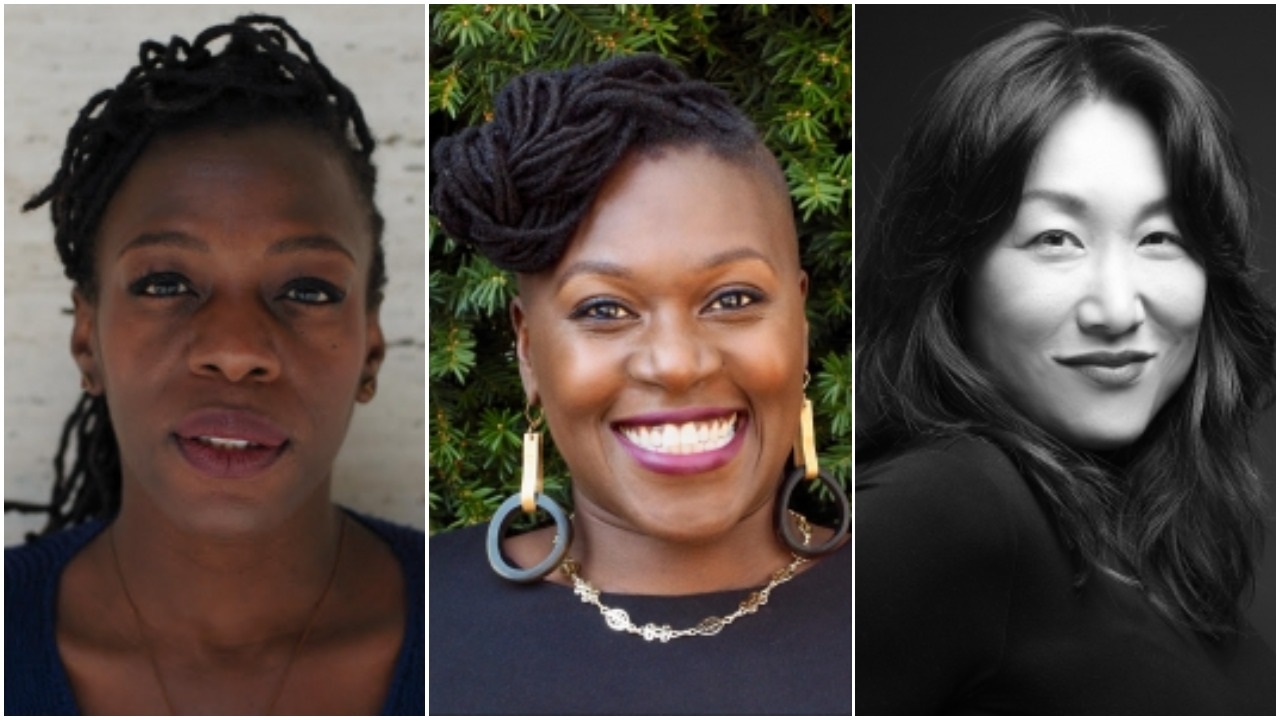Media Girlfriends on ensuring historically misrepresented voices are centred in podcasting

Co-founder Hannah Sung talks about the podcast prodco's philosophical and business strategies, and the lack of grants for the medium.
For Media Girlfriends, navigating Canada’s podcasting world has so far been a journey of partnerships, sponsorships and hope that one day the country will have more grants for the medium.
The Toronto-based podcast prodco is led by journalists of colour (pictured, L-R) — co-founder Garvia Bailey, founder and executive director Nana aba Duncan and co-founder Hannah Sung — and has carved out a niche during the pandemic with a mandate of creating projects with great care to ensure “stories get told properly, that the right voices get centred.” They aim to “honour, respect and centre historically misrepresented voices” and “work towards more inclusion, diversity and perspectives in media.”
Media Girlfriends evolved from a 2016 podcast created by Duncan as a way for the then-CBC Radio host to have frank conversations with fellow journalist-girlfriends about their lives and careers.
The trio produced the Black Canadian history podcast series Strong and Free, launched last October with Historica Canada, which paid them using using funds specifically earmarked for creating media for educational purposes. Media Girlfriends also produced Between Us with Wes Hall for the Toronto Star, which paid them a fee and got sponsors for the podcast. The three are now working on a third project with the Samara Centre for Democracy in the same manner.
Sung spoke with Playback Daily ahead of this week’s Media Girlfriends workshop titled How to Build a Career in Podcasting (without Selling your Soul) at the virtual Hot Docs Podcast Festival.
Playback: What are the challenges and opportunities you’ve faced in the podcast space in Canada?
Hannah Sung: I think the challenges are the same as maybe any small business, which is that we want to do the thing, we want to make the widget, and yet there’s so much work around that of creating the business. Just today I was having a meeting with someone and I started laughing and said, “We are three journalists who are now trying to catch up on all this business stuff.”
I think the podcasting industry, if you can even call it one industry, is figuring itself out. And media in general is clearly going through a lot of disruption. I don’t just mean on the business side; I mean in terms of the voices and who gets to speak and when, and what stories get to be told and by whom. So the opportunities for us are that we are people who are pretty experienced and have worked in a lot of major news and media organizations. And we want to do things differently. I think there’s very much an appetite out there from audiences for things being done differently, stories being done differently, different voices being centred.
PB: What are your business goals for Media Girlfriends?
HS: Right now our business goals are to pay ourselves fairly, to do the work we want to do on a daily basis, and then we’re good. Because we’re not really in the business of a jackpot mentality of, “I’m going to put these ideas into the ether and then one of them is going to become the next Survivor.”
That being said, we are actually right now developing our first podcast concept where we do hope to retain the IP. And that’s because it’s based on a lot of personal storytelling from me. If it were not about the personal storytelling, we probably wouldn’t even care about the IP, to be honest, but we just have to have that level of respect for what it is that makes up a personal story, and to not sell our personal stories so cheaply.
PB: How has ecosystem of podcasting in Canada changed during the pandemic?
HS: Podcasting is really easy to do in the pandemic, because it is — technically speaking — easy to do remotely. Nobody likes doing that, because when you really want to get into it with someone, you want to be in the same room, you want to feel that person-to-person energy…. But something that I wish Canada had was just more money and more opportunity for the creation of this kind of content. There are very few places to go in Canada to make a podcast and to get paid. We see the golden era of TV and we love to hold up examples of our best filmmakers, and I wish there could be more support for podcasting, storytelling as an industry.
We have a thriving legacy and ongoing Canadian literature scene, because there’s a lot of support for that. I really see podcasting, or at least the storytelling aspect of podcasting, as being similar to novels, or they can be. But I don’t really see the support there in the grant system.
This interview has been edited and condensed for brevity.
Photo credit, L-R: Garvia Bailey by Justin Morris; Nana aba Duncan by Ian Stevens; Hannah Sung by May Truong.

 The definitive CDN broadcast and production resource.
The definitive CDN broadcast and production resource.










